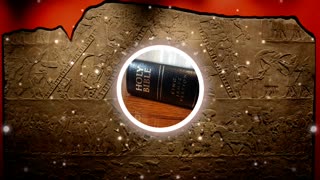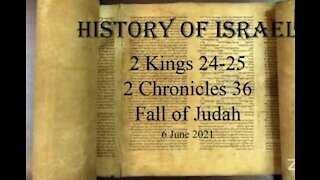2 Kings 24-25, 2 Chronicles 36 | The Destruction of Judah: What Got Us to This Point?
For today's full reading download the full podcast.
Listen on Apple Podcasts: https://podcasts.apple.com/us/podcast/gods-plan-your-part/id1662005086
Listen on Spotify: https://open.spotify.com/show/2IjaYq4cYgy8WIcw5zWj9g
Listen on Google Podcasts: https://podcasts.google.com/feed/aHR0cHM6Ly9mZWVkcy5idXp6c3Byb3V0LmNvbS8yMTA1NzUyLnJzcw==
Instagram: https://www.instagram.com/godsplanyourpart/
Facebook: https://www.facebook.com/godsplanyourpart/
Support the Show: https://www.buzzsprout.com/2105752/support
Contact us: godsplanyourpart@gmail.com
#podcast #God #dailybible #bibleinayear #dailybiblepodcast #christianity #faith #bible #love #christian #biblestudy #bibleverse #scripture #godsplanyourpart
2 Kings 24 recounts the downfall of Judah as King Nebuchadnezzar of Babylon captures Jerusalem. Jehoiakim, who rebelled against Babylon, is succeeded by his son Jehoiachin. Nebuchadnezzar besieges Jerusalem, takes Jehoiachin and the nobles into exile, and loots the temple treasures. This marks the beginning of the Babylonian captivity.
The concluding chapter of 2 Kings depicts the tragic end of Judah. After a prolonged siege, Jerusalem falls to Nebuchadnezzar. Zedekiah, the last king of Judah, witnesses the execution of his sons and is then blinded before being taken captive to Babylon. The city walls are broken down, the temple is burnt, and a majority of the population is exiled to Babylon. The chapter portrays the utter devastation of Judah and the culmination of God's warnings through the prophets.
2 Chronicles 36 details the final days of the kingdom of Judah. The focus is on the reigns of the last four kings: Jehoahaz, Jehoiakim, Jehoiachin, and Zedekiah. The chapter highlights their disobedience to God's laws and the repeated prophetic warnings they ignored. Nebuchadnezzar's conquest of Jerusalem, the destruction of the temple, and the exile to Babylon are described. The narrative serves as a culmination of the historical account in the Chronicles, emphasizing the consequences of unfaithfulness and the fulfillment of God's judgments.
The trajectory from God's promise to Abraham to the eventual destruction of Jerusalem in 586 BCE is a profound narrative that reveals both God's faithfulness and humanity's choices. God's covenant with Abraham, made in Genesis, marked the beginning of a special relationship with a chosen people and a promise of land and blessings. This promise manifested through generations, culminating in the establishment of the kingdom of Israel, including the glorious reigns of David and Solomon. However, the seeds of downfall were sown as kings and people deviated from God's ways, leading to division, disobedience, and idolatry.
The eventual destruction of Jerusalem in 586 BCE by the Babylonians marked a somber turning point. The promises of land and descendants seemed bleak, and the once-great city lay in ruins. However, the narrative doesn't end there. The later books of the Old Testament, including Ezra, Nehemiah, and the prophetic writings, reveal God's ongoing plan of restoration. The return of the exiles, the rebuilding of the temple, and the preservation of the Davidic lineage were all part of God's continued commitment to His covenant despite human shortcomings.
In tracing this trajectory, we witness the tension between human choices and divine promises. The story underscores the significance of obedience, faithfulness, and repentance in maintaining the covenant relationship with God. Despite the devastation and exile, God's enduring love and desire for reconciliation remained at the forefront.
-
 9:49
9:49
Gods Plan Your Part
9 months agoJeremiah 51-52 | Jerusalem is Destroyed, Babylon is Destroyed, God is Faithful
63 -
 2:21
2:21
FreeTheBeaver
4 months ago2 Kings (Summary)
40 -
 2:21
2:21
FreeTheBeaver
4 months ago1 Kings (Summary)
591 -
 27:36
27:36
CatholicReboot
10 months agoEpisode 1441: The Bible - Book of Kings II
524 -
 3:27
3:27
Holy Bible
2 years agoHoly Bible 2 Kings chapter 24
185 -
 46:14
46:14
Treeoflifehouston
3 years ago2 kings 24 25 Fall of Judah
28 -
 5:04
5:04
Holy Bible
2 years agoHoly Bible 2 Kings chapter 14
504 -
 28:52
28:52
CatholicReboot
11 months agoEpisode 1359: The Bible - Book of Kings I
203 -
 1:06:32
1:06:32
The Origin Story of Jesus
6 months agoTHE ORIGIN STORY OF JESUS Part 66: The Kings of Judah
281 -
 7:18
7:18
Holy Bible
2 years agoHoly Bible 2 Kings chapter 18
229